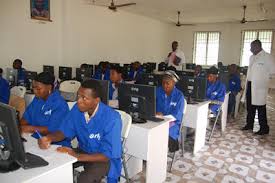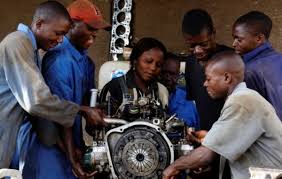Improving Engineering Practice in Nigeria
Overview:
Engineering is an application of scientific knowledge, mathematics, social, economic, and practical knowledge to invent, design, innovate, build, maintain, research, and improve structures, machines, systems, tools, components, materials, processes, solutions, and organizations.
The engineering profession is a skilled occupation, usually, one requiring specific education, training, knowledge or experience. The essence of the word “professionalism in engineering” can be defined as the possession and autonomous control of a body of specialized knowledge, which when combined with honorific status, confers power upon its holders.
Professionalism in engineering can also be defined as a profession involving the exercising of the body of unique, expert and knowledge. Professionals have always been linked with the notion of “service” so that a profession is described as a group of people organized to serve a body of specialized knowledge in the interests of society based on the perceived relationship.
The problem that faces any professional community is how it could regulate itself effectively to justify its autonomy, while ensuring that the clients of its members and society as a whole benefit from the profession’s and the individual professional’s actions, rather than becoming their victims.
Therefore, an engineer is a professional practitioner of engineering that concerned with applying scientific knowledge, mathematics and ingenuity to develop solutions for technical problems.
1. Establishment of the Council for the Regulation of Engineering in Nigeria, COREN and its duties:
The Council for the Regulation of Engineering in Nigeria, COREN, is highest engineering body in Nigeria. Established by decree 55 of 1970, Law of the Federal Republic of Nigeria and amended by Decree 27 of 1992, COREN has the following functions:
1. COREN is empowering to determine what standards of knowledge and skills are to be attained by persons seeking to be registered as engineering personnel and to raise those standards from time to time as circumstances may permit.
2. COREN, therefore, carries out accreditation visitation to all engineering programmes in Universities, Polytechnics and Monotechnics, and Technical Colleges as a quality assurance mechanism to ensure that engineering programmes meet the minimum requirements in
i. Academic Structure (Curriculum).
ii. Staffing (Academic, Technical and Administrative)
iii. Physical Facilities (Laboratories, Workshops, Classrooms, Office accommodation, Environment, etc.)
iv. Library Facilities
v. ICT
vi. Management and Funding.
3. COREN ensures that engineering personnel in Nigeria continue to develop professionally to ensure they meet up with the dynamics and challenges of global competition.
4. Continuing Professional Development (CPD) this is a major objective of COREN. As part of its mandate, the Council, therefore, organizes regular workshops, seminars and conferences for its engineering personnel with facilitators coming from all parts of the world.
5. COREN Supervised Industrial Training Scheme in Engineering (SITSIE)
The Supervised Industrial Training Scheme in Engineering (SITSIE) is a one-year postgraduate training programme in a relevant industry, for an engineering graduate of an accredited University or Polytechnic, designed to meet his/her practical experience requirements for the purpose of registration with COREN as a professional engineer or an engineering technologist.
It is an empowerment mechanism which could possibly lead to engineering personnel creating their own jobs and thereby drastically reducing unemployment.

2. Challenges facing indigenous engineers in Nigeria.
Since Nigeria’s Independence in 1960, successive governments of the Federation have devoted a lot of effort to the creation of physical facilities, such as roads, power supply, water supply, educational buildings, housing, hospital, communication etc., which are basic requirements for the social and economic well-being of the nation. And since then the nation has been faced with a lot of engineering challenges.
The issue now is the extent to which Nigerian engineers responded to these engineering challenges for sustainable development. Much has been written about sustainable development. The varying definitions are based on the economic, social, environmental and political realities, sustainable development suggests a condition wherein the decisions are undertaken today do not prevent possible alternative decisions in the future.
In addition, it is generally accepted that sustainable development is driven by a need to demonstrate increased environmental awareness in our day-to-day lives and decision making. It will be interesting to see where the Nigerian engineer stands in the myriad of engineering changes facing a developing country like Nigeria.
The followings are the challenges facing indigenous engineers in Nigeria:
1. Engineers being all in all: In most government and private establishments in Nigeria, engineering personnel are assuming to know all. A civil engineer can be employed to do the work of an electrical engineer, chemical engineer, Mechanical Engineer etc at the same time. Instead of seeking the services of engineering professionals in these other areas of engineering.
2. Corruption: Most engineering projects in the country are carried out using the fifty percent (50%) rule, thereby eating the capital and not the profit. That is, contractors giving even more than fifty percent of the total cost of a project to some corrupt government officials and politicians before actually embarking on a project and in most cases, since the remaining part of the money will not be enough to do the job, the project may not be carried out and if it is carried out at all, it is usually sub standard or abandoned.
3. Politics: the nature of the training of the engineers do not actually expose him/her to be actively involved in politics, though they may be passively involved. For instance, a power engineer in a power station cannot be actively involved in politics. Since power stations are usually sited in secluded areas.
4. Engineers not fellowshipping with their colleagues: most engineering personnel occupying managerial positions are not registered with the Nigerian Society of Engineers (NSE) and the Council for the regulation of engineering in Nigeria. (COREN). Hence, such person’s may seem not concern with the advancement of engineering and technology in the country.
5. Nonengineers carrying out engineering contracts using engineering credentials: Most engineering contractors carry out engineering projects using engineering credentials of engineering professionals in order to win or get engineering contracts.
6. Research and Development: Government lackadaisical attitude towards development hinders research opportunities in research institutions and universities. The government considers research and development to cost a lot of money and there is no link between research institutes, universities and industries in the country.
3. To enhance the performance of the indigenous engineer, the following must be done:
1. The Council for the Regulation of Engineering (COREN) should have a political committee that will concern itself with lobbying the National and State Assemblies to give it more sweeping powers to regulate engineering practice in the country and to make laws for the benefit of the indigenous engineer, engineering practice and the country as a whole.
There is no better time to do this than now when we are in a democracy.
2. Council for the Regulation of Engineering (COREN) should encourage engineers to form group practices with diverse engineering interests; able to meet every conceivable engineering challenge in the country. All such groups must, however, be registered with the (COREN).
3. The practices should have a number of foreign reputable affiliates to call on in the event of being given jobs they are ill-equipped to handle. Backed by law, all major engineering jobs from State and Federal governments should be given to indigenous engineering firms. Council for the Regulation of Engineering in Nigeria (COREN) should have facilities to monitor adherence to this.
4. Companies bringing in foreign engineering companies to execute jobs for them must have clearance from Council for the Regulation of Engineering in Nigeria (COREN). Such companies must be compelled to use Nigerian engineers, except where suitably qualified ones are not available. Such companies must pay a percentage of the contract sum to Council for the Regulation of Engineering in Nigeria. While COREN engineers must be involved in monitoring such jobs and ensuring that standards are adhered to.
5. It must be the duty of the Council to place newly qualified engineers in practice and determine their remuneration until they acquire enough experience to establish their own practices.
6. The Council, supported by government and financial institutions, should be able to operate firms hiring and maintaining engineering equipment.
7. The Federal government should be persuaded to establish an engineering bank, to give financial assistance to indigenous engineering firms, with the COREN being the guarantor.
8. Time is ripe to have the Nigerian standard (call it COREN standard) for engineering goods and products e.g. road construction, drainages, runways, engine oils, street light fittings etc. This is needed for the purpose of ensuring standards and harmonizing equipment, which on the long run, is economically cheaper.
It is amazing in this age to see road network in our housing estates, without sidewalks or street lights. If there is a COREN standard, anyone handling such a job will know he has to provide them.
9. Similarly, our roads are awash with all manner of asphalt overlay which cracks every rainy season. We also have all sorts of non-tropicalized new automobiles dumped on Nigeria. This should not be.
The above suggestions, with addition and extractions, will form a formidable framework for the upliftment of the Nigeria engineer and engineering practice.
4. The benefits of the nation:
- The nation will also benefit from these in the sense that the huge amount of money repatriated home by foreign construction companies will be greatly curtailed, and will remain in the country for its development and that of its people.
- The indigenous engineer will be more exposed thus making him more innovative.
- Nigerian engineers and firms will tremendously improve in skill and equipment, such that their services will be sought outside the country. This will earn more revenue for the country.
- The country will be reckoned with in international engineering circles since we will be able to boast of our own engineering standards.
- It will boost pioneer efforts in the utilization of indigenous materials and methods in various engineering designs and constructions.
- It will improve the capabilities and well-being of all other professions allied to engineering.
- With solid teams of private practice engineers, consultancy and research work will keep the engineers in the teaching fields and civil service busy.

5.Utilization of engineers, career development, Skills development and training opportunities for the indigenous engineers must be a priority.
The issues of utilization of engineers, career development, Skills development and training opportunities for the indigenous engineers in Nigeria must be considered by the Council for the Regulation of Engineering in Nigeria. (COREN):
1. Utilization of engineers:
Council for the Regulation of Engineering in Nigeria must be considered this as an important issue in the context of enthusing our young engineers is the extent to which graduates are under-utilized in industry, sometimes being employed as technicians, or in posts as professional engineers, but under-taking tasks which do not reflect their qualifications and ability.
Employers must recognize that newly emerging graduates have a different mix of skills and personal aspirations than previous generations of engineers. Graduates themselves must also recognize that engineers are required not only for mainstream engineering but also for senior management positions.
2. Career development:
Council for the Regulation of Engineering in Nigeria must make sure that engineers must remain effective at their jobs despite the rapid progress in technology which threatens to make current knowledge obsolete. They must also be flexible enough to adapt to the changing needs of both business and market trends.
The skill of the individual must also be targeted towards meeting the corporate objectives of companies so that policies can be successfully implemented. To be effective, flexible and targeted the individual employee needs a range of skills that vary at different management levels, and as one moves along a career path it is necessary to collect, develop or substitute a variety of talents and abilities.
The technical skills learnt in a first-degree course will hardly last eight years, but the ability to learn and study, by definition, must last much longer.
Developing an ability to perform effectively across a range of discipline does not happen by wishful thinking, accident or edit. It results from careful career planning, appropriate broad-based training and a willingness to respond positively to diverse and demanding career opportunities.
3. Skills development:
Council for the Regulation of Engineering in Nigeria must aware that there is a general recognition that successful management requires a mixture of responsible attitudes, motivation, determination, leadership, awareness of and responsiveness to change. It must be backed by a sound education, vocational knowledge, experience and well-developed communication skills.
Across the range of management levels, the mix and emphasis of such factors will vary with the circumstances and the environment, and engineers need to acquire and develop these attributes in order to perform at each stage of their career.
4. Training opportunities:
Council for the Regulation of Engineering in Nigeria must take this as a priority in discharging their duty. The identification of development needs and training opportunities leads to the requirement for a plan of action. Generally two parallel and complementary paths of development are available to the engineers.
It is possible to build up a portfolio of skills by actively participating in a series of company-based, company-supported or company- recognized short courses. Provided that careful records are maintained, these achievements will be acknowledged by both the employer and the professional institution.
A major issue in deciding how to proceed is the question of who will provide financial support. There are four explored, these being the employer, government, Scholarship and loans.

© 2017 ODEWOYE FRANCIS SUNDAY








